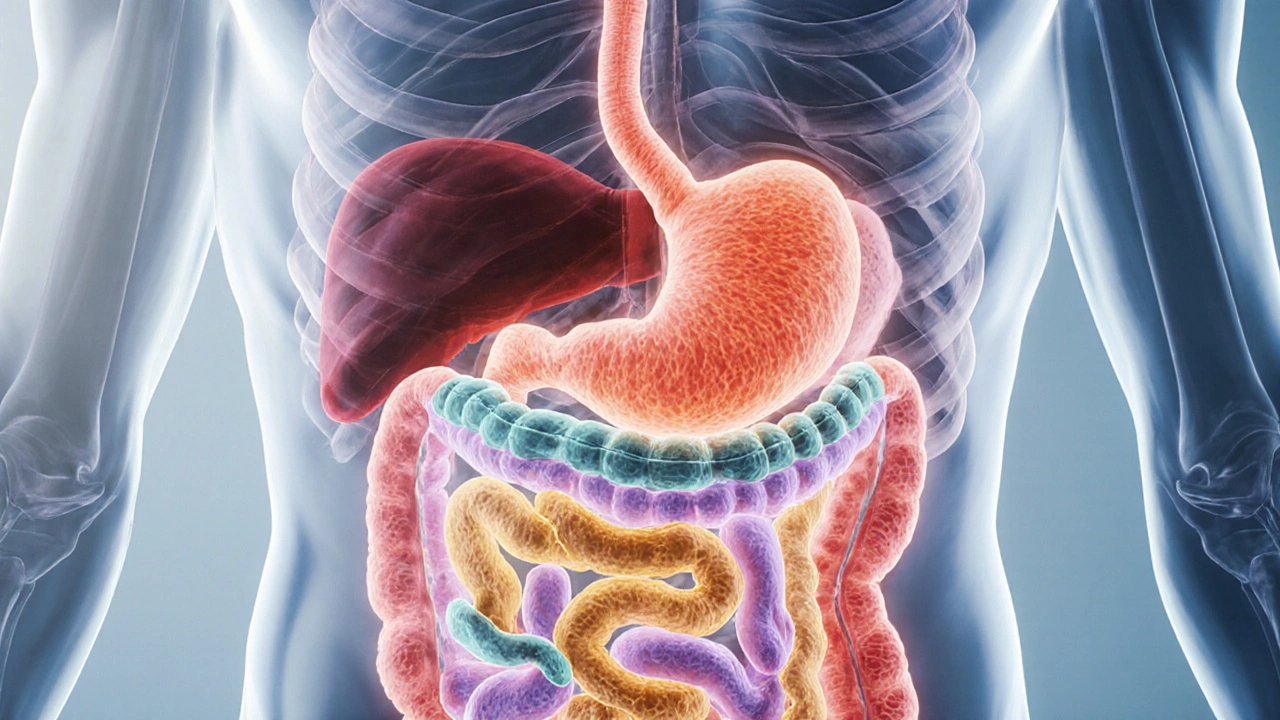Abdominal Burning Symptom Checker
Possible Causes Based on Your Symptoms
If you’ve ever felt a abdominal burning sensation that seems to come from inside your gut, you’re not alone. Many people describe it as a hot, uncomfortable feeling that can flare up after meals, during stress, or for no obvious reason. While occasional heartburn is normal, persistent burning may signal an underlying issue that needs attention.
Quick Take
- Identify the pattern: timing, foods, stress, medication.
- Common medical causes include GERD, gastritis, ulcers, pancreatitis, and gallstones.
- Lifestyle tweaks-smaller meals, low‑acid diet, stress management-help most mild cases.
- Over‑the‑counter antacids work short‑term; prescription meds target specific conditions.
- Seek medical care if pain is severe, lasts >2 weeks, or comes with fever, vomiting, or weight loss.
What Is Abdominal Burning?
Abdominal Burning is a sensation of heat, pain, or discomfort located in the stomach or upper abdomen, often described as a “fire” feeling that may radiate to the back or chest. It can arise from the lining of the stomach, the esophagus, the pancreas, the gallbladder, or even the nerves that supply the abdominal wall. The feeling varies: some describe a mild warmth, others a sharp, searing pain that worsens after eating or lying down.
Top Medical Causes
Below are the most frequent culprits behind a burning abdomen. Each definition includes a brief microdata block so search engines can understand the entity.
Gastroesophageal Reflux Disease (GERD) occurs when stomach acid repeatedly flows back into the esophagus, irritating its lining and causing a burning sensation in the chest and upper abdomen.
Gastritis is inflammation of the stomach lining, often triggered by alcohol, NSAIDs, or Helicobacter pylori infection, leading to a gritty, burning feeling.
Peptic Ulcer refers to an open sore in the stomach or duodenum that causes a gnawing, burning pain, especially between meals or at night.
Pancreatitis is inflammation of the pancreas, often from gallstones or heavy alcohol use, producing a deep, burning pain that radiates to the back.
Gallstones are hardened deposits that can block the bile duct, causing a sharp, burning discomfort in the right upper abdomen after fatty meals.

How the Causes Compare
| Condition | Typical Pain Location | Common Triggers | Onset Pattern | First‑Line Remedy |
|---|---|---|---|---|
| GERD | Chest to upper stomach | Spicy food, caffeine, lying down | After meals, worsens at night | Proton‑pump inhibitor or H2 blocker |
| Gastritis | Mid‑upper abdomen | Alcohol, NSAIDs, H. pylori | Immediate after irritant exposure | Antacids + eradicate H. pylori if present |
| Peptic Ulcer | Upper abdomen, may radiate to back | Acidic foods, stress, NSAIDs | Pain 2‑3hours after eating | Triple therapy (PPI + antibiotics) |
| Pancreatitis | Upper abdomen, deep to back | Heavy alcohol, gallstones | Sudden, severe onset | Hospital‑based fluid resuscitation |
| Gallstones | Right upper quadrant | Fatty meals, rapid weight loss | After fatty food, may be intermittent | Cholecystectomy if symptomatic |
Practical Remedies You Can Try at Home
Before you rush to the pharmacy, consider these proven, low‑risk strategies. They work best for GERD, mild gastritis, or occasional heartburn.
- Mind your meals: Eat smaller portions, chew slowly, and avoid eating within three hours of bedtime.
- Identify trigger foods: Keep a simple diary for a week. Common culprits include citrus, tomato‑based sauces, chocolate, mint, and carbonated drinks.
- Stay upright after eating: A 30‑minute walk or sitting upright reduces reflux. Avoid tight clothing that compresses the abdomen.
- Hydrate wisely: Sip water throughout the day but limit large volumes during meals, which can increase stomach pressure.
- Try over‑the‑counter antacids: Calcium carbonate or magnesium hydroxide can neutralize acid quickly. Use as directed, and don’t exceed the daily limit.
- Consider acid reducers: If antacids aren’t enough, a short course of H2 blockers (e.g., ranitidine) or a proton‑pump inhibitor (e.g., omeprazole) can provide longer relief.
- Manage stress: Deep‑breathing exercises, yoga, or a brief meditation session after a stressful event can lower stomach acid production.
- Limit alcohol and tobacco: Both irritate the stomach lining and weaken the lower esophageal sphincter.
When Simple Fixes Aren’t Enough
If your burning sensation persists despite the above steps, it’s time to dig deeper. Here’s what to watch for:
- Pain lasting more than two weeks or getting progressively worse.
- Associated symptoms: vomiting (especially with blood), unexplained weight loss, fever, jaundice, or night sweats.
- Sudden, severe pain that radiates to the back-possible pancreatitis.
- Difficulty swallowing or a sensation of food stuck in the throat-could signal esophageal damage.
In these scenarios, schedule a visit with a primary‑care physician or gastroenterologist. They may order tests such as:
- Upper endoscopy (EGD) to visualize the esophagus, stomach, and duodenum.
- Abdominal ultrasound or CT scan to check the gallbladder and pancreas.
- H. pylori breath or stool test.
- Blood work for pancreatic enzymes (amylase, lipase).
Checklist: Quick Self‑Assessment
- Do you notice burning after specific foods? - Yes → Keep a food diary.
- Does the pain improve when you sit up or take antacids? - Yes → Likely acid‑related.
- Is the pain sharp, radiating to the back, and accompanied by nausea? - Yes → Seek medical care promptly.
- Are you taking NSAIDs regularly? - Yes → Consider a switch or add a protective agent.
- Any recent weight loss or loss of appetite? - Yes → Schedule a doctor’s appointment.

Frequently Asked Questions
What’s the difference between heartburn and abdominal burning?
Heartburn specifically describes a burning feeling behind the breastbone caused by acid reflux into the esophagus. Abdominal burning is a broader term that can originate from the stomach, pancreas, gallbladder, or even the abdominal wall.
Can stress really cause a burning stomach?
Yes. Stress increases cortisol, which can boost stomach acid production and slow digestion, leading to a sensation of heat or discomfort.
Are antacids safe for long‑term use?
Occasional use is fine, but chronic reliance may mask serious conditions and disrupt mineral balance. If you need antacids for more than two weeks, see a doctor.
When should I suspect gallstones?
If the burning comes after a fatty meal, sits in the right upper abdomen, and may be accompanied by nausea or jaundice, gallstones are a strong possibility.
Is it normal for the pain to wake me up at night?
Night‑time pain often points to reflux or ulcer disease, because lying down reduces gravity’s help in keeping acid where it belongs. Elevating the head of your bed can help.
Putting it all together, a burning sensation in the abdomen is rarely a mystery when you track your habits, know the common culprits, and act early. Simple dietary tweaks and OTC remedies solve most mild cases. However, persistent or severe burning deserves a professional eye to rule out ulcers, pancreatitis, or gallstone complications. Stay aware, listen to your body, and don’t ignore warning signs.


11 Comments
James Higdon
It is incumbent upon each of us to regard our bodily signals as moral imperatives, not merely optional inconveniences. When the abdomen burns, the responsible course is to seek professional guidance rather than dismiss it as a trivial nuisance. Ignoring persistent pain betrays a neglect of personal stewardship and, by extension, the social contract we share with our community. Proactive consultation with a healthcare provider demonstrates respect for one’s own health and for the resources of the medical system. Therefore, delay no longer; schedule an appointment and document your symptoms diligently.
Wanda Smith
Consider, for a moment, that the very information presented in mainstream medical literature may be curated by entities with vested interests. The pharmaceutical conglomerates profit from chronic ailment narratives, subtly encouraging patients to remain dependent on over‑the‑counter antacids while withholding the true, inexpensive remedies rooted in dietary discipline. This covert orchestration is why many individuals experience recurring abdominal fire despite following generic advice. By scrutinising the patterns of recommendation, one may discern the hidden agenda that prioritises profit over genuine healing. Thus, it is prudent to question the source and seek alternative, non‑commercial pathways to relief.
Bridget Jonesberg
One must not underestimate the theatricality inherent in the human experience of suffering, for the burning abdomen is not merely a physiological event but a staged drama upon the visceral theatre of our bodies. The quintessentially elite perspective demands a meticulous chronicle of each culinary transgression, each nocturnal anxiety, as if composing an opus of self‑inflicted anguish. Only through such exhaustive documentation can the discerning individual disentangle the intricate tapestry of causation-be it the capricious acidity of reflux, the clandestine ulcerations, or the perfidious gallstones lurking in the hepatic shadows. It is, after all, a matter of intellectual propriety to elevate the conversation beyond the pedestrian recollection of ‘it hurts’ into a discourse replete with scholarly nuance. One might argue that this verbosity itself serves as a protective veil, shielding the fragile ego from the starkness of a simple, unadorned truth.
Marvin Powers
Ah, the classic “my stomach feels like a furnace” dilemma-let’s tackle it with a smile and a dash of sarcasm, shall we? First off, props for recognizing the issue; most folks just power through and end up on a carousel of bad meals and worse advice. Imagine your gut as a demanding guest at a dinner party: it needs the right ambience, the right menu, and definitely not a rock‑hard stare from your shirtsleeve. Start by treating it like a VIP: smaller plates, chew like you’re auditioning for a food‑critique show, and give it a three‑hour break before you hit the sack. Sprinkle in some low‑acid fruits, ditch the midnight pizza, and watch the fire subsides like a bad reality‑TV drama. And remember, if you ever feel like the inferno is auditioning for a sequel, call a professional-don’t let your stomach write the next tragedy.
Jaime Torres
yeah antacids work sometimes
Wayne Adler
Look, I get that the burn feels like a freaking inferno and you’re probably thinking “just ignore it” but that’s the worst advice you can give yourself. The gut isn’t some glorified metal pipe; it’s a delicate organ that reacts violently when you flood it with booze, NSAIDs, or stress-yeah, that’s real. You need to stop treating your stomach like a punching bag and start listening to the warning signs before they turn into something far worse. I’m not saying you’ve got to become a monk, but adjusting meal sizes, skipping the late‑night coffee, and maybe putting a lid on that stress could save you a lot of pain. And if the pain keeps coming back like an unwanted sequel, go see a doc – don’t gamble with your health.
Shane Hall
First and foremost, thank you for sharing the details of your discomfort; acknowledging the problem is the cornerstone of any effective treatment plan.
The burning sensation you describe aligns closely with classic presentations of gastroesophageal reflux disease and mild gastritis, both of which respond well to lifestyle modifications.
Begin by implementing a systematic eating schedule: consume smaller, balanced meals every three to four hours, and avoid any ingestion within three hours of bedtime.
Elevate the head of your sleeping surface by at least six inches; this simple geometric adjustment utilizes gravity to keep gastric contents where they belong.
Hydration is essential, but sip water throughout the day rather than guzzling large volumes during meals, as excessive gastric distention can exacerbate reflux.
Identify and eliminate trigger foods-citrus, tomato‑based sauces, chocolate, peppermint, and carbonated beverages are frequent culprits.
Incorporate a modest portion of alkaline foods such as bananas, oatmeal, and steamed vegetables to neutralize excess acid.
If over‑the‑counter antacids provide only fleeting relief, consider an H2‑blocker like ranitidine or a short course of a proton‑pump inhibitor such as omeprazole, but limit usage to eight weeks without medical supervision.
Parallel to dietary changes, adopt stress‑reduction techniques: diaphragmatic breathing, progressive muscle relaxation, or a brief daily mindfulness practice can significantly lower acid secretion.
Physical activity, such as a brisk 30‑minute walk after meals, further assists in gastric emptying and reduces the likelihood of reflux.
Avoid tight clothing, especially around the waist, as constriction can increase intra‑abdominal pressure and worsen symptoms.
Limit alcohol intake and cease smoking; both substances impair the lower esophageal sphincter’s function.
Monitor your symptoms using a simple journal: record food intake, timing, and severity on a scale of 1‑10 to detect patterns that might otherwise be invisible.
Should the burning pain persist beyond two weeks, intensify, or be accompanied by alarm signs such as vomiting blood, unintended weight loss, or jaundice, seek immediate medical evaluation for possible endoscopic assessment.
Remember, the body is remarkably resilient, and with diligent attention to these evidence‑based strategies, most individuals experience substantial relief within weeks.
Christopher Montenegro
Upon rigorous scrutiny, the present composition exhibits a conspicuous paucity of evidentiary substantiation, relying instead upon anecdotal heuristics that betray a lamentable tendency toward pseudoscientific exposition. The lexical selection oscillates between colloquial platitudes and inflated technical jargon, thereby obfuscating rather than elucidating the pathophysiological mechanisms under discussion. Moreover, the recommended therapeutic algorithms neglect to integrate the stratified risk assessment frameworks mandated by contemporary gastroenterological protocols, rendering the guidance not only suboptimal but potentially deleterious. It is imperative that the authors rectify these methodological deficiencies by incorporating controlled clinical data, explicit dosing regimens, and a hierarchical decision tree that conforms to evidence‑based standards. Failure to do so perpetuates misinformation and undermines the fiduciary trust vested in health‑related publications.
Sarah Kherbouche
Yo, this article sounds like it was cooked up by a bunch of foreign med‑industry hacks trying to sell us pills instead of real American common‑sense solutions. They don't even mention good old home‑grown remedies like apple cider vinegar or simple herbal teas that our grandmas swore by. Stop shilling imported junk and start respecting the tried‑and‑true stuff that made our forefathers tough as nails.
MANAS MISHRA
Thank you for the comprehensive overview; the structure is clear and the guidance practical. I would suggest a brief note on the importance of correct verb tense when describing symptom onset, as consistent tense improves readability. Also, consider adding a bullet point about the role of fiber in regulating gastric acidity. Overall, an excellent resource for readers seeking actionable steps.
Lawrence Bergfeld
Great work; the tips are useful-especially the suggestion to elevate the head of the bed!; please continue to update with the latest guidelines.